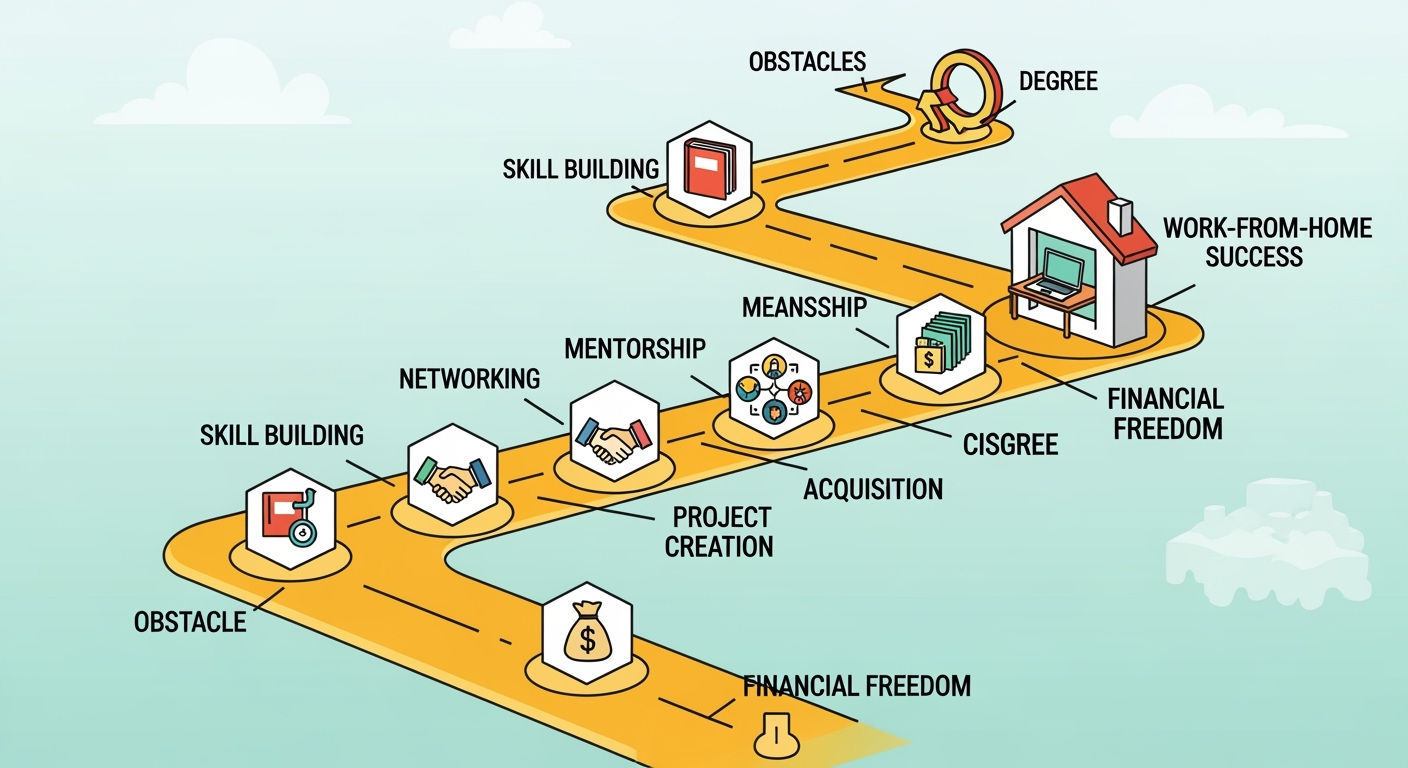12 Work-From-Home Jobs That Don’t Require a Degree: Your Path to Financial Freedom
Hey there, future remote worker! Is the idea of working in your pajamas, skipping the commute, and having more control over your day appealing? Of course, it is! For years, I believed that a college degree was the golden ticket to any decent job, especially one that offered flexibility. Man, was I wrong.
I remember pouring over university prospectuses, thinking, “If I don’t get this piece of paper, I’m doomed to a cubicle farm forever.” It took me years, and a few wrong turns in my own career, to realize that the world of work, especially remote work, has dramatically evolved. What truly matters now are skills, dedication, and a willingness to learn. It’s not about the sheepskin on your wall; it’s about what you can do.
In this guide, I’m going to pull back the curtain on 12 fantastic work-from-home jobs that prove you don’t need a fancy degree to build a successful and fulfilling career. These are roles where practical experience, a solid portfolio, or a knack for self-teaching shine brightest. So, let’s ditch the degree dogma and dive into some real opportunities, shall we?
Why Remote Work is No Longer Just a Dream (Even Without a Degree)
The landscape of employment has shifted profoundly, especially in the last few years. Companies are increasingly open to remote talent, recognizing the benefits of a global talent pool and reduced overhead. This isn’t just a trend; it’s the new normal for many industries.
And here’s the kicker: many of these roles don’t require traditional academic qualifications. Instead, employers are looking for demonstrable skills, a strong work ethic, and the ability to be a self-starter. Think about it: if you can do the job well, why should a piece of paper dictate your eligibility? I’ve seen countless folks, myself included on occasion, snag amazing gigs just by showing what they could do, not what school they went to.
This shift means incredible opportunities for people who are eager to learn, adapt, and prove their worth without going thousands of dollars into student loan debt. It’s empowering, honestly. I wish someone had told me this when I was twenty!

The Dozen Remote Roles That Don’t Demand a Diploma
Alright, let’s get down to brass tacks. Here are 12 legitimate, accessible work-from-home jobs that you can pursue right now, often with just a good internet connection and a can-do attitude.
1. Virtual Assistant (VA)
What It Is: A Virtual Assistant is like a personal or executive assistant, but they work remotely. Their tasks can be incredibly varied, from managing emails and scheduling appointments to social media management, basic bookkeeping, and customer service. It’s often referred to as the Swiss Army knife of remote jobs.
Why No Degree Needed: VA work is all about organizational skills, communication, and reliability. These are skills you pick up through life experience, previous jobs, or even managing your own busy household. No specific degree teaches you how to juggle five different clients’ calendars!
How to Get Started: Start by identifying your strengths. Are you great at organization? Tech-savvy? A social media whiz? You can offer specialized VA services or be a generalist. Platforms like Upwork, Fiverr, or even specialized VA agencies are great starting points. Build a simple portfolio of your capabilities.
My Take: Early in my own journey, before I fully embraced the online world, I considered hiring a VA. The sheer variety of tasks they could handle was mind-blowing. If you’re organized and love helping people, this could be your jam. It’s a fantastic way to learn the ropes of running a small business, even if you’re just assisting others.
2. Customer Service Representative
What It Is: This role involves helping customers with their queries, complaints, or product information via phone, email, or chat. Many companies, from tech giants to small e-commerce stores, have entirely remote customer service teams.
Why No Degree Needed: Empathy, patience, problem-solving, and good communication skills are paramount here. While some companies might prefer a high school diploma, specific college degrees are rarely a prerequisite. They’re looking for good people skills, plain and simple.
How to Get Started: Look for job postings on major job boards like Indeed, LinkedIn, or specific remote job sites. Many companies offer comprehensive training for their products and systems. Practice your active listening and conflict resolution skills!
My Take: I once got stuck on a tech issue for hours. The customer service rep who finally helped me didn’t sound like they had a PhD in IT, but they were incredibly patient, walked me through every step, and solved my problem. That’s the kind of person companies want – someone who can connect and resolve.
3. Content Writer / Copywriter
What It Is: Content writers create articles, blog posts, website content, and other long-form materials. Copywriters focus on persuasive text for marketing, advertisements, sales pages, and emails. Both are vital for online businesses.
Why No Degree Needed: While an English or Journalism degree can be helpful, many successful writers are self-taught. What matters is your ability to write clearly, concisely, and engagingly. A strong portfolio of writing samples is far more valuable than a diploma.
How to Get Started: Start by writing! Create a blog, offer to write for friends’ businesses, or take on small freelance gigs. Build a portfolio that showcases your versatility. Learn about SEO basics if you’re leaning towards content writing. Platforms like Upwork, Fiverr, and specialized content mills are good places to find initial work. I’ve personally hired writers based purely on their portfolio, not their academic background. It’s all about the words!

4. Social Media Manager
What It Is: You’re the voice and strategist behind a brand’s social media presence. This involves creating content, scheduling posts, engaging with followers, analyzing performance, and staying on top of trends for platforms like Facebook, Instagram, TikTok, and LinkedIn.
Why No Degree Needed: Social media moves too fast for traditional academia to keep up. Success here relies on intuition, creativity, understanding algorithms, and genuine engagement. Many social media managers start by managing their own successful personal accounts or small businesses.
How to Get Started: Demonstrate your proficiency by building a strong personal social media presence or offering to manage a local small business’s accounts for free or a low fee to build experience. Take free online courses on social media marketing. Show them you know how to build a community and get results.
My Take: I’ve seen some incredible self-taught social media whizzes who understand the nuances of platforms better than any marketing graduate. They get the memes, they get the vibe, and they know how to make a brand feel human. That’s a skill you can’t teach in a lecture hall.
5. Transcriptionist / Captioner
What It Is: Transcriptionists convert audio or video into written text. Captioners add text overlays (captions or subtitles) to video content, often for accessibility for the hearing impaired. Think doctor’s dictations, legal proceedings, or YouTube videos.
Why No Degree Needed: This job requires excellent listening skills, fast and accurate typing, and attention to detail. While medical or legal transcription might benefit from specialized training, general transcription doesn’t typically require a degree. There are online courses that can help you hone your skills, but they aren’t university degrees.
How to Get Started: Many online platforms like Rev or Scribie hire freelance transcriptionists. You’ll usually need to pass a typing test and a short transcription assessment. Invest in good headphones and practice, practice, practice!
My Take: My sister dabbled in this when she was looking for flexible work. She found it challenging at first to get the hang of different accents and background noise, but once she got into a rhythm, it was a steady income stream for her. Patience is key here.
6. Data Entry Specialist
What It Is: Data entry involves inputting information into computer systems or spreadsheets. This could be anything from customer details to sales figures, product inventories, or survey responses. It’s often about accurate, repetitive work.
Why No Degree Needed: The core requirements are accuracy, speed, and attention to detail. You might need basic computer literacy and familiarity with programs like Excel, but these are skills easily learned through online tutorials or practical experience. No four-year degree is going to make you a better typist.
How to Get Started: Look for data entry roles on general job boards, freelance platforms, and remote-specific sites. Some companies might ask for a typing test. Highlight your organizational skills and meticulous nature.
My Take: I’ve known people who treated data entry as a stepping stone. It might not be the most glamorous job, but it’s reliable, often flexible, and can build valuable computer literacy skills that are transferable to many other roles. It taught me the importance of double-checking everything!
7. Web Developer (Self-Taught)
What It Is: Web developers build websites and web applications. This can range from front-end (what you see and interact with) to back-end (the server, database, and application logic) or full-stack (both). They use programming languages like HTML, CSS, JavaScript, Python, and more.
Why No Degree Needed: The tech industry is famous for valuing skills and portfolios over traditional degrees. Many highly successful developers are entirely self-taught, learning through online courses, coding bootcamps, and building personal projects. Your GitHub profile is often more important than your university transcript.
How to Get Started: Dive into free or low-cost online coding platforms like freeCodeCamp, The Odin Project, or Codecademy. Build small projects to apply what you learn. Create a portfolio website to showcase your work. Network with other developers. This is a field where continuous learning is expected.
My Take: This is one area where I truly regret not diving in earlier. The demand is huge, and the earning potential is fantastic. My nephew, who dropped out of college, taught himself to code and now works remotely for a major tech company. It’s a testament to dedication and self-learning.

8. Graphic Designer (Self-Taught)
What It Is: Graphic designers create visual content for branding, marketing, websites, social media, and more. This includes logos, brochures, website layouts, infographics, and illustrations. They use software like Adobe Photoshop, Illustrator, and Canva.
Why No Degree Needed: While design schools exist, many top designers are self-taught, honing their skills through practice, tutorials, and a keen eye for aesthetics. A strong portfolio showcasing diverse projects and a unique style is the ultimate credential.
How to Get Started: Learn design principles (color theory, typography, layout). Master design software – there are tons of free tutorials. Practice by creating mock projects or offering design services to local small businesses. Build a portfolio website or use platforms like Dribbble or Behance to display your work. Consistency and feedback are your best friends here.
My Take: I’ve worked with freelance designers who blew me away with their creativity and skill, and not one of them ever mentioned a degree. They showed me their portfolio, and it spoke volumes. If you’ve got an artistic eye and a passion for visuals, this is a brilliant path.
9. Bookkeeper
What It Is: Bookkeepers are responsible for recording financial transactions, managing accounts payable and receivable, reconciling bank statements, and often preparing financial reports for businesses. They ensure that a company’s financial records are accurate and up-to-date.
Why No Degree Needed: While an accounting degree is great for CPAs, bookkeeping often requires vocational training or certifications rather than a four-year degree. Attention to detail, organizational skills, and a good understanding of basic accounting principles are key. Many online courses and certification programs can get you job-ready.
How to Get Started: Take an online bookkeeping course or pursue a certification (e.g., from the American Institute of Professional Bookkeepers). Familiarize yourself with accounting software like QuickBooks or Xero. Many small businesses and entrepreneurs need part-time remote bookkeepers. You can find gigs on freelance sites or by networking.
My Take: My friend runs a small business, and her remote bookkeeper is an absolute lifesaver. She’s not an accountant by trade, but she’s meticulous and keeps my friend’s finances in perfect order. It’s a highly valued service for busy business owners.
10. Online Tutor
What It Is: If you’re proficient in a particular subject, skill, or even a language, you can teach students remotely. This can range from K-12 subjects to test prep, music lessons, or even software skills.
Why No Degree Needed: Your expertise in the subject matter and your ability to teach effectively are far more important than a teaching degree for many online tutoring platforms. For language tutoring, being a native speaker can be enough.
How to Get Started: Identify your niche. Sign up for online tutoring platforms like Chegg Tutors, VIPKid (for English), or even create your own independent tutoring service. Good reviews and word-of-mouth will be your best marketing tools. Patience and clear communication are crucial.
My Take: I once needed help with a specific software program and found an online tutor who taught me everything I needed to know in just a few sessions. She wasn’t a certified teacher, but she knew her stuff inside and out. If you’ve got knowledge, share it!
11. Tech Support Specialist
What It Is: These professionals provide technical assistance and troubleshooting to users experiencing issues with hardware, software, or computer systems. Many companies offer remote tech support, meaning you can help people from anywhere.
Why No Degree Needed: While a computer science degree is valuable, many entry-level tech support roles prioritize problem-solving skills, basic computer knowledge, and excellent communication. Certifications like CompTIA A+ are often more relevant and achievable than a four-year degree.
How to Get Started: Gain foundational IT knowledge through online courses or self-study. Consider obtaining certifications like CompTIA A+. Look for remote tech support roles on job boards. Highlight any hands-on experience you have with computers, even if it’s just fixing your family’s Wi-Fi!
My Take: I’ve called tech support more times than I care to admit. The best reps were the ones who could explain complex issues simply and patiently. They didn’t sound like they were reading from a textbook; they sounded like they genuinely wanted to help me fix my problem. That’s the real skill.
12. Digital Marketing Assistant
What It Is: This is a broad role that supports a marketing team or manager. Tasks might include managing email campaigns, basic SEO tasks, social media scheduling, content promotion, data analysis, or market research. It’s a great entry point into the lucrative world of digital marketing.
Why No Degree Needed: Digital marketing evolves constantly, and practical experience and staying current with trends often outweigh formal education. Many online courses and certifications can provide the necessary skills. Enthusiasm for online business and a willingness to learn are highly valued.
How to Get Started: Take free online courses from Google or HubSpot on digital marketing fundamentals. Learn about SEO, content marketing, email marketing, and social media. Offer to help a small business with their marketing. Building even a simple online presence for yourself can demonstrate your skills. The more you explore platforms like Gainote.com – Maximize Your Income, Master Your Side Hustle, the more you’ll understand the ecosystem.
My Take: My first foray into online business involved a ton of digital marketing trial and error. I learned by doing. If you’re curious about how online businesses grow and how to reach customers online, this field offers endless opportunities for self-starters.

Essential Skills That Trump Any Degree
Okay, so we’ve established that a degree isn’t a hard requirement. But what is required? Here are some non-negotiable skills that will make you indispensable in any remote, degree-free job:
- Self-Discipline & Motivation: Working from home means you’re your own boss, in a way. No one’s looking over your shoulder. You need to be able to set your own schedule, stay focused, and meet deadlines without external prompting.
- Communication Skills: Whether it’s written or verbal, clear and concise communication is paramount. You’ll be interacting with clients, colleagues, and customers, often without face-to-face interaction.
- Time Management & Organization: Juggling tasks, managing deadlines, and prioritizing effectively are crucial for staying productive and efficient. My advice? Get a good planner or use project management software. It saved my bacon more times than I can count.
- Problem-Solving: Remote work often means you need to be resourceful. When an issue arises, you can’t just walk over to a colleague’s desk. You need to be able to research, troubleshoot, and find solutions independently.
- Adaptability & Continuous Learning: The online world changes constantly. Tools evolve, new platforms emerge, and best practices shift. A willingness to learn new software, skills, and strategies is vital for long-term success. Seriously, never stop learning; it’s the most valuable investment you can make.
- Tech Savvy (to a degree!): You don’t need to be a coding wizard, but comfort with basic computer operations, video conferencing tools, cloud storage, and project management software is a must.
Finding Your Remote Gig: Where to Look
So, you’re ready to dive in. Where do you start looking for these amazing opportunities? Don’t just stick to the biggest job boards; many specialized platforms cater specifically to remote work.
- Remote Job Boards:
- Freelance Platforms:
- LinkedIn: Use the “Remote” filter in your job searches. Also, connect with people in industries you’re interested in.
- Company Websites: Many companies that embrace remote work will list openings directly on their careers page.
- Networking: Tell everyone you know you’re looking for remote work. You never know who has a lead or can connect you with someone who does. Sometimes the best jobs aren’t advertised at all.
Final Thoughts: Your Future Awaits, Degree or Not
Look, I get it. The idea that you need a traditional degree to succeed is deeply ingrained in our society. For years, I subscribed to that belief, and it held me back from exploring some incredible paths. But the truth is, the world is moving beyond that old paradigm, especially in the remote work space.
The jobs we’ve discussed today are just the tip of the iceberg. What they all share is a focus on practical skills, real-world experience, and a strong personal drive. If you’re willing to learn, hustle, and prove what you can do, then a fulfilling, flexible, and financially rewarding work-from-home career is absolutely within your reach.
Don’t let the lack of a degree deter you. Instead, let it fuel your determination to build skills, showcase your talent, and create the work-life balance you’ve always dreamed of. The future of work is here, and it’s far more inclusive than you might think. Now go out there and get it! You’ve got this.


